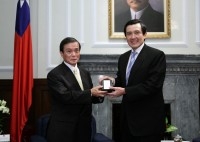News & activities
 News releases
News releases

President Ma Ying-jeou on August 1 said that Taiwan and Japan are improving their relationships with Mainland China, which is enabling Taiwan and Japan to boost friendly relations with each other and Mainland China at the same time. He said that this is a situation that has not been seen in the 60 years after World War II. The president said many scholars and experts associated with various think tanks in the believe this will have a lasting impact on peace in . This also has led to cautious optimism among many sectors that the improvement in relations between the two sides of the Taiwan Strait will foster stability and peace in in the future.
President Ma made the remarks when meeting with the new Japan Interchange Association Taipei Office Chief Representative Saito Masaki at the Presidential Office in the afternoon.
President Ma welcomed Representative Saito on taking up his new position here. He said that Representative Saito in 1966 came to to learn Chinese and that he is an extremely senior diplomat in ’s diplomatic corps. He previously served as ’s ambassador to as well as its envoy to . The president said that he is pleased that decided to send to such an experienced diplomat who has a deep understanding of the ethnic Chinese community. President Ma praised Representative Saito for his being such a conscientious diplomat. He said that Representative Saito has a good understanding of the development of relations between and , which means that he has done considerable homework prior to arriving in .
President Ma said that he is delighted to see such a strong growth in tourism between the two countries. The president noted that Korean nationals make up the largest number of foreign tourists to , followed in second place by tourists from . Meanwhile, more tourists from visit than from any other nation. The president said he hopes to see continued growth in the future. He added that the decision by and to mutually recognize the driver’s licenses issued by the other is a symbol of good relations between the two. President Ma said that in the two-plus months since his taking office, both sides have been eager to see a further improvement in ties.
President Ma said that over the past year or two, many high-level visits have been held between officials from and to the other. He said that naval vessels from the two countries have even made port calls in the other. In addition, the two sides have reached a consensus on jointly developing oil fields in the . All of these developments are unprecedented in the post-war era, President Ma said, adding that this will be extremely beneficial to peace in .
President Ma stressed that Representative Saito is arriving in just as relations between and are set to enter a new era. He said this is an optimal time, and he hopes that both sides will work in good faith and with sincerity to address various issues. The president said he is confident that relations between the two countries can improve significantly.
Representative Saito expressed his appreciation to President Ma for taking time out of his busy schedule to meet with him. He said that relations between Taiwan and Japan are extremely good, evidenced by the implementation of visa-free courtesies by each country to tourists from the other, as well as the large number of tourists traveling between the two nations. Each year, over 2.5 million visits are made by people from the two countries to the other. Representative Saito noted that is ’s second largest trading partner, while is ’s fourth largest trading partner. Given this good environment, he said he deeply hopes that during his tenure in that relations between the two sides can develop further. Representative Saito also said that the improvement in cross-strait relations is beneficial in creating further room for activities between and . He added that he believes that in the future , and can create a win-win-win situation.


